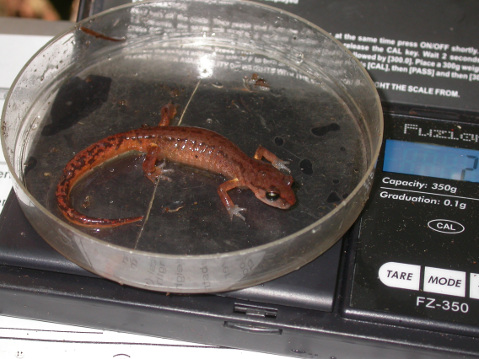Salamander Diet May Affect Climate Change
Predation on Invertebrates by Woodland Salamanders Increases Carbon Capture

Woodland salamanders perform a vital ecological service in American forests by helping to mitigate the impacts of global warming.
Global warming occurs when greenhouse gases like carbon dioxide are released into the atmosphere. Woodland salamanders facilitate the capture of this carbon before it is released by feeding on invertebrates (beetles, earthworms, snails, ants, etc.) that would otherwise release carbon through consumption of fallen leaves and other forest debris. Woodland salamanders are the most common vertebrate species in American forests; consequently, these small, seldom-seen animals may play a significant role in regulating the capture of carbon from leaf litter in forest soils.
Dr. Hartwell Welsh, Jr., research wildlife biologist at the U.S. Forest Service’s Pacific Southwest Research Station (PSW), helped conduct a study in northwestern California that examined how woodland salamander predation on invertebrates indirectly affects the amount of leaf litter retained for soil-building where nutrients and carbon are captured at the litter-soil interface.
The objective of the study was to investigate the role of salamanders in regulating invertebrate abundances and how that influenced leaf litter retention. The study included soil moisture as a covariate and field enclosures on the forest floor to quantify the effects of woodland salamanders. The study was conducted over two rainy seasons, and found that woodland salamander predation on invertebrates suppressed some populations of invertebrates and released others, with the overall result of increased litter retention and carbon capture in the soil. However, the strength of the effect was modulated by the timing and amount of precipitation.
This research is unique and important, and will increase public understanding of how the impacts of global warming may be countered and raise awareness of the ecological role woodland salamanders play in the forest carbon cycle. “The renowned evolutionary biologist E.O. Wilson once said it is the little things that run the world,” Dr. Welsh said. “While Wilson probably had in mind invertebrates, I think he would agree that our research on the influence of one of the primary predators on invertebrates, and their influence on the forest carbon cycle, is a good example of what he was talking about.”
The full article can be read here.
Headquartered in Albany, California, the Pacific Southwest Research Station develops and communicates science needed to sustain forest ecosystems and other benefits to society. It has research facilities in California, Hawaii, and the U.S.–affiliated Pacific Islands. For more information, visit www.fs.fed.us/psw/.



